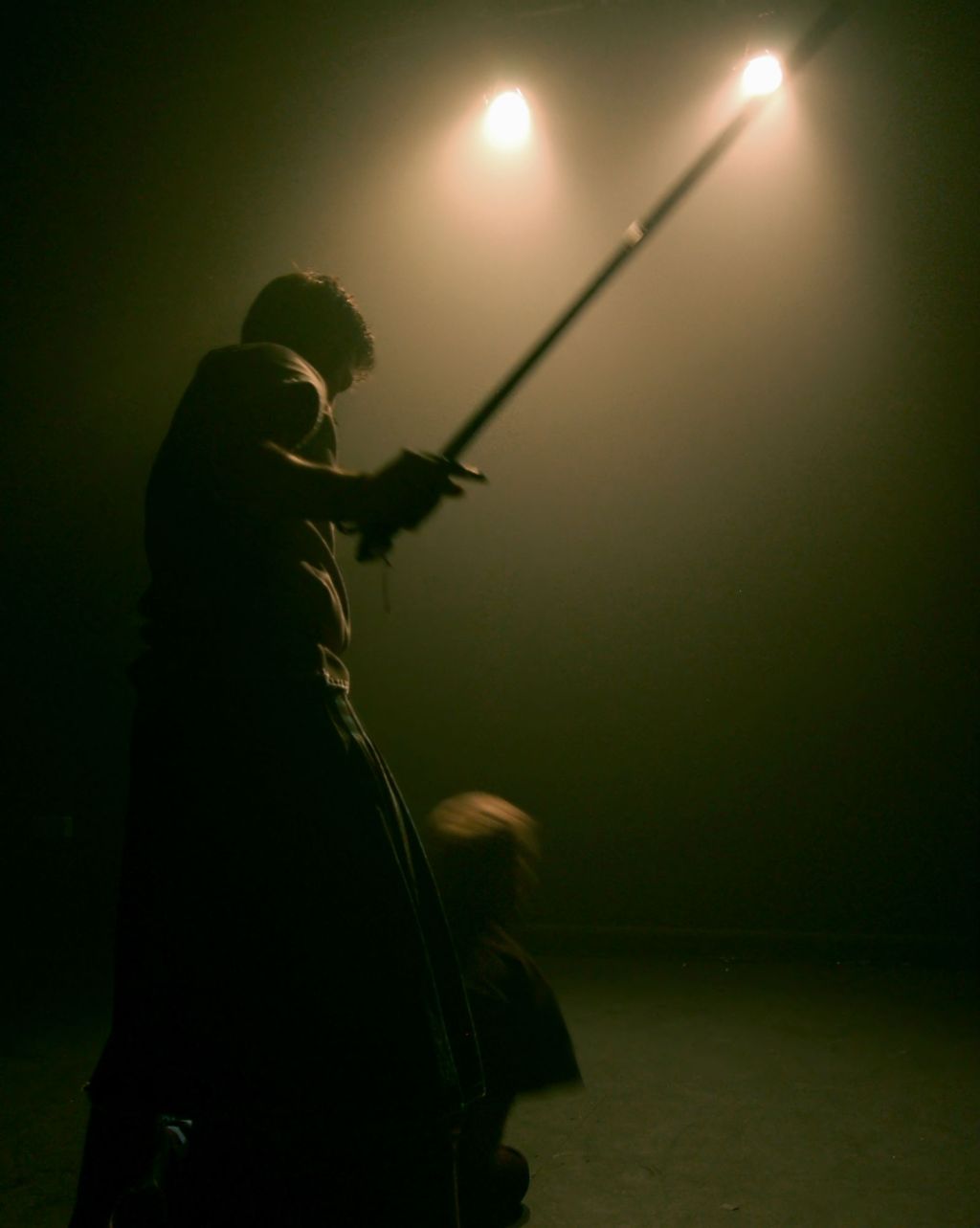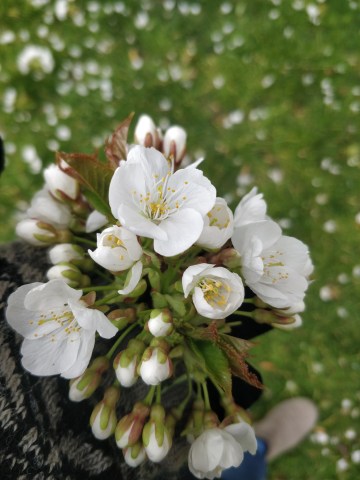Fame

I am very grateful for my anonymity.
I’m aware that there have been plenty of books, which are read by lots of people (hurrah!) in a wide and occasionally surprising number of places (huzzah!) but, and this is a key and groovy thing for me… I’m not there while that happens. Indeed, on the rare occasions I see people reading my works in public, I tend to do a comic double-take followed by a quick scarper from the scene trying not to giggle.
Like all writers, my publisher knows that I long for praise and hand-holding and to be told that the words on the page are actually okay, but also like most writers the idea of ever being identified for what I am, by strangers, is a little horrifying. Somehow the connection between my writing the words and Actual People reading them… remains a largely disassociated concept in my brain and this, I think, can only be a good thing. I know there are photos of me out there on the web… but a photo is only a single frozen moment; usually a cheesy one, or an image of being intimidated by a camera, which I definitely am. A photo doesn’t capture the moment of waiting-at-the-bus-stop me or the getting-angry-at-the-post-office me and so I’m protected as much by being out of context as by the sheer implausibility of a random stranger having memorised my features from google images.
People desire praise, or at the very least appreciation, regardless of what they do. Different people want praise for different things… an average cook who has tried very hard to make a special meal; an elevator engineer who got the system to work again after only 8 hours stuck on the bottom floor, and wants others to appreciate how hard it was; even your local roadsweeper who hopes you realise that this mess isn’t tidying up itself. With writers the need for appreciation can often be enhanced by how hard it is to come by. The financial rewards are minimal, which is one fairly standard indicator of success ticked off the list; editors are busy and your readership are divided from you by that self-same barrier of disassociation that I’m often so grateful for. Even technicians want praise and appreciation – but as our work is often so specialist, we tend to only get it from our colleagues who remain the only ones who can understand why what you did with that D.C. power supply was really so damn smart.
So yes, praise and appreciation… it’s a natural human instinct and something I personally have no problem providing for others who have merited it, or even who just need it to be okay after a difficult day. But then there’s fame. Or perhaps more precisely – there’s celebrity. And this is where I begin to struggle.
As a lampie, I spend a lot of time watching actors. See them come off stage after a successful performance, and you could well believe that they had walked on the moon, the emotions are so high. And it’s easy to understand why – they aren’t just receiving appreciation, they’re receiving it from total strangers. People with nothing invested in admiring their work, have never-the-less taken this opportunity to rise to their feet and applaud, stranger-to-stranger. It’s the ultimate accolade and it’s very easy to see why it’s a heady drink.
Actors who haven’t quite yet made it – and this includes the vast majority of all actors everywhere, sad to say, who all know that they may yet make it even though they haven’t quite yet – tend to deny that they want success for the fame and the glory. Gimme cash, they reply. But in an industry where success is, by very definition, being identified and appreciated by a huge wealth of strangers, claims that the adoration of the masses is a burden rather than a temptation can fall a little hollow. Which isn’t to say that the majority don’t do it for the love of the work itself; they do – but let’s not disassociate praise from success here.
Then, of course, there’s a huge supply of people who seek adoration without necessarily having any qualities at all by which it can be obtained. I was genuinely horrified when I heard how many people applied for the RADA acting course and worse! How many put as their reason for learning to act, ‘so I can be famous’. When did this become a goal in and of itself? If fame must happen, then surely dear god it should happen for a damn good reason – for a remarkable talent or an amazing achievement – rather than because the need to be praised is especially strong. I get genuinely angry when I hear talk of ‘celebrities’ whose only qualification for the interest expressed in them by the world is that they want it really, really badly.
And finally there’s the downsides. With so many celebrities popping up for such flimsy reasons, society has almost swung full circle and now there is a serious danger that Joe, who was praised last week, will this week be condemned and his life picked apart by an angry crowd who have suddenly realised that the object of their adoration wasn’t really worth it. Fame now become voyeurism, and the only sensible – if far too rarely chosen option – seems to be to run away as fast as you can.
There’s also Scary Fame, and occasionally even I can feel mildly sorry for those few individuals who have genuinely acquired Scary Fame through talent and gripe and who, as a result, will find knickers being proffered to them by unlikely strangers for implausible purposes. I say ‘Scary Fame’ partially because the emphatic capitals kinda make sense, but also because it can be genuinely intimidating.
The one time I had to talk to a Scary Famous actor, I did so for two reasons. 1. I was mildly curious and he seemed vaguely affable. 2. He was consistently failing to find his light, owing to shocking inconsistency in where he went on stage. Motive 1. wasn’t really going to swing it for me by itself, because I’m not particularly good at talking to strangers, but motive 2. was becoming such a problem that the whole lighting department was getting genuinely angry about it. As possibly the most junior member of the department, and arguably the least fussed, I wasn’t really candidate material for the ‘can you please stand still so we can light you’ conversation – but none of my colleagues seemed willing to give it a go. When I finally mustered the guts to go up and ask the actor to behave himself, please, he fairly enough asked why it had taken so long for us to tell him this.
“We’re intimidated,” was the answer that came naturally to my lips, and even as I said it I realised it was probably true. Why? The very idea seemed ridiculous – intimidated of a vaguely ginger guy who couldn’t find his light and or tell his DMX from his MIDI? Sure, he’s a good actor but I’ve met good teachers, and good doctors, and good writers whose work I have admired and respected and with whom I have had no problems whatsoever in striking a conversation. And damnit, it seemed even more absurd that I was intimidated, considering that I’d been force-feeding Stephen King ice from a bucket by the age of 3 (long story) and knew perfectly well that the authorial aspect of my life could cause surprise and consternation, were it to be revealed. What was it about fame that changed things? I wanted absolutely nothing from this man other than he stood two steps further downstage so we could light him. I was vaguely curious as to how he’d respond to this request, but then I was also vaguely curious as to the story of the man behind the bar who appeared to have votive Buddhist tattoos up his right arm, so that interest is pretty generic. Perhaps it was the praise of so many others – at the point where strangers are willing to offer their time, their interest, their adoration and quite possibly their clothing up to this rather random individual, starting a conversation with anything less than a high-stakes opener seems a little frail. There is a sense that, in terms of our social expectations, those who have Scary Fame are functioning in a world so far removed from what the rest of us understand that bridging the gap is in itself, a complex diplomatic procedure, and one I wasn’t really revved for.
“Why don’t people just talk to me?” offered Scary Famous Man.
I made feeble noises. Eleven novels in – more than a million words behind me and a few award nominations to boot – and I settled for default neutral sounds. My ‘ah’ was on top form.
A minor conversation therein followed about the difficulties of talking to people. I suggested that being a female graduate of the London School of Economics didn’t necessarily give you the right tone to be a lighting technician. I found myself using ‘mate’ I explained, despite plainly being what I was – a graduate of a posh girls school in West London who’d gone on to study the Ottoman Empire before discovering that Lights Are Cool. It was just a form of social blending.
“I hate that,” exclaimed Scary Fame. “I hate it when people are all like ‘yeah, yeah, mate, how you doin’?’ when they’re actually posh. Just be yourself!”
I may have fallen back on more neutral sounds at this juncture. I was, after all, guilty of this sin already…
Three days later, I was doing my pre-show checks and there was Scary Fame, warming up on stage.
“Hey, mate, you okay?” asked one of the stage hands.
“Yeah, yeah, mate, grand,” came the reply. “How you doin’?”
I managed to make it into a backstage corridor for laughing out loud. For all of Scary Fame’s exclamations to the contrary, it seemed that even he, despite the adoration, praise and appreciation, still needed another kind of belonging… and suddenly it was far harder to be intimidated in any way at all.





